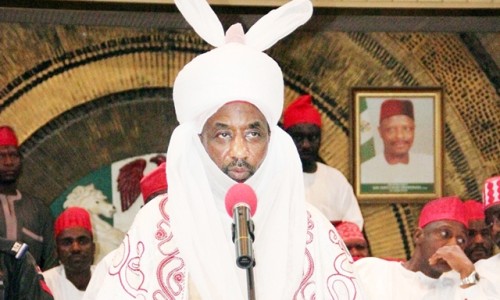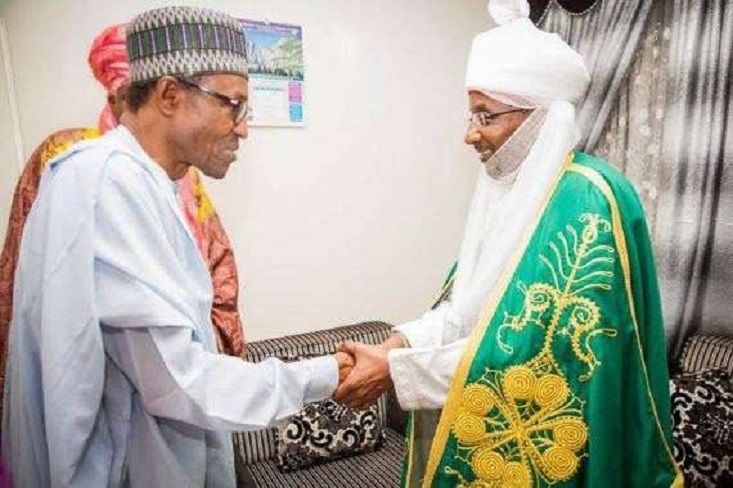
This Query From Former Nsa Gen. Azazi Alleges Strong Regional-Sensitivity, Tribal-Consciousness And Possible Sympathy With Boko Haram Sect By Former Cbn Governor Mallam Sanusi Lamido Sanusi
Does Buhari Have A Plan To Improve Nigerian Economy?
- No (70%, 1,107 Votes)
- Yes (30%, 465 Votes)
Total Voters: 1,572
Events, comments, actions and body language of key political, religious and traditional actors in the wee of the 2015 elections have suggested extreme tribal and regional consciousness. Nigeria and Nigerians could rightly be said to have been caught in the web of extreme sentiments of tribe, religious and political consciousness, ideologies and affiliations. The affairs of Nigeria are not run on the balance of sound nationalism nor can it be said to be hinged on equity, fairness and morality. So far, most of the Nigerian leaders at tribal, religious, political or traditional levels have expressed strong sentiments of tribal or regional consciousness such that an average Nigeria is bewildered at how far the silken thread of unity that once held us together as a people can still linger. Could the unity propagated by the so-called founding fathers be said to be rooted in total collectiveness and inclusiveness of a people who saw things from same perspective or was the unity a foisted concept ideology that is currently crying to be freed.
Hitherto, no Nigerian leader past or present could be exempted from allegations of promoting regional, tribal and religious sentiments. It seems to have reached its peak and now the boat of unity tends to be heading for rock except the current President Buhari-led government redirects the vessel of unity to safe shores where empathy, goodness, collectiveness and fairness thrive. With the agitation for Biafran State in the South East, Boko Haram menace in the North East and periodic killings by Fulani herdsmen within Middlebelt {especially Benue State, Plateau State and recently Taraba State; with the threat of militancy raging in the South South and tribal consciousness being stirred in the South West, one may be compelled to deduce that the unity we preach is more verbose than practiced and that unless decisive pro-peoples’ actions are taken that tends to bring all Nigerians to the feast of equity and inclusiveness, the unity of Nigeria may soon fizzle away like banquets of the burbles and the winds.
From events and comments credited to some key players within the corridors of powers, it could easily be deduced that a seed of discord once planted in the mind of an average Nigerian has grown to a static oak that if you critically listen to Nigeria so-called leaders within the political, religious and traditional class, it could not be said to be totally free from that strong sentiments that we have perennially strived to suppress and not overcome. Unity in duality seems so elusive with us as a people. Hatred, divisiveness and apathy to national consciousness have consistently thrived within the hearts of our hearts of an average Nigerian even though sometimes we exude smiles and verbosely define how united we are as a people.
For those apolitical figures who may want to call a spade by its name, it could be rightly said {though subject to correction} that most political victories have been won on basis of tribal and religious affiliations. The 2015 election exposed the porousness of these burning consciousness and sentiments that the result conspicuously displayed how tribal-conscious and regional-sensitive we are as a people vis-à-vis our National-consciousness and that is why at all arms intellectualism and military intervention in the face of the prevailing restiveness, regional and tribal agitations have not abated. In the North, there seems a greater regional consciousness within that polity that there seems a script being acting out as events unfold. You can hardly thus far see any strong political figure contesting the victory of another Northerner in any Election Tribunal even where it has been found out that there were massive rigging and malfunctioning of the so-called Voters’ card reader. So far, certain elections at gubernatorial level have been nullified or better still, being threatened to be nuliffied by the election tribunals within Southern Axis that one could begin to asked if the election in the Northern Axis was perfectly conducted as if they were supervised by political angels.
The election has come and gone. Both the victorious and the vanquished have not sheathed their sword. The victorious seems to have only considered the political angle of their victories without looking at the emotional and spiritual angles. The government of the day has engaged more in extending their political blades than they have done to heal the hurting wounds in the minds of the losers. It has almost become a winner-takes-all game and the losers seem to be licking their own wounds of defeat. The Buhari led administration seems to be favouring one-sidedness and judging by utterances, body language and promptings of the current President, all points to a leader who may achieve relatively more in fighting corruption, but may score zero in strengthening the soft thread of Nigeria Unity.
He seems so engulfed in partisanship, avenging those that have stepped on his toes; positioning governance to favour his associates and anyone found outside the political boat he steers may be fated to the very depths of deep waters. Tribal and regional consciousness have done Nigeria more harm than good even though Nigeria is not the country with the highest number of tribes like Indonesia and India. Nigeria’s case of tribalism cannot surpass that of Rwanda who by strategic planning by its current leadership healed every wound, killed every tribal-consciousness and promoted national consciousness in the stead. Buhari looks like a leader who will bend the rules of the game going by the kind of confidants and advisors that cluster around him. The likes of Nasir El Rufai is notorious for tribalism and could be described as a religious fanatic who will never sale a sound and principled ideologies to the President. El Rufai looks like a master in the game of deception and has been described various as someone who thrives in fallacies and fallacious scheming.
Previously, the former Central Bank Governor now the Emir of Kano, Mallam Sanusi Lamido Sanusi has been accused of tribal biasness by his critic, the Late National Security Adviser Gen. Azazi. While Mallam Sanusi’s admirers attribute his controversial statements as gutsy, others ascribe it as mere mischief going by his tribal, religious and regional antecedents. He stirred the corruption accusation when he alleged that former President Goodluck Jonathan’s led government has dipped hand in Nigeria foreign reserved and carted away $39Bm from oil proceeds. Although he admitted to have erroneously quoted the figure he earlier said claiming that the department that manages Nigerian foreign reserve deceived him with the wrong figure. Many appreciated that singular courage of speaking up in a society where every lip seems to have been gagged. Others see it as mischievous and part of what they termed the ‘Northern Agenda’ to wrestle power out from the hand of a man many believed pampered and condoned corruption. ‘Why has he not been making that accusation on the president before now? He has only few months to go and suddenly, for a man who once bent down to thank Mr President for retaining his job in the midst of damning security reports that pointed to his ineligibility to hold such position to be accusing the same President of corruption few months to his exit is either playing an ostrich or is acting out part of the script assigned him’. One of his critics who craved anonymity said. ‘What’s Mallam Sanusi’s definition of corruption? Is nepotism and favouritism not part of corruption which is punishable by death in some Far Asian countries? Another analyst said.
THE PRESS INTERVIEW THAT EARNED MALLAM SANUSI LAMIDO NSA’s QUERY
In 2nd February, 2012, the then National Security Adviser to the President General O.A. AZAZI transmitted a query from his office to the then Governor of CBN {Copies attached} over an interview he {Mallam Sanusi} granted Financial Times where among other issues, Sanusi alleged:
a} That the rising level of violence in Nigeria is attributable to the uneven distribution of resources
b} That ‘It is now necessary to focus funds on regenerating other regions of Nigerian other than Niger Delta
c} That the ‘‘Additional federal funds allocation to the Niger Delta States has created ‘’A structural imbalance of enormous proportions’’ with some states not having enough money and other having too much’’
d} That ‘When the theft of oil by profiteers is considered, the imbalance between oil producing states in the South South for Niger Delta States and States in the North is compounded.
e} That ‘The supplemental distribution of funds to the Oil producing States, on top of the standard federal allocations, which was effected to reduce inequality in resources in the first place has now created new disparity in state resources, fostered resentment in the poorest states and encouraged the despicable terrorist activities of the Boko Haram sect’
To the claims above, General Azazi expressed shock that Mallam Sanusi could make such claim as accordingly to the letter, ‘’Your alleged assertions directly attribute the activities of the Boko Haram Sect to the current formula for allocating funds from the federal account. Not only is there no empirical evidence to support such a statement, conventional wisdom in Nigeria refutes that assertion. Experts obviously have provided numerous explanations for the emergence of Boko Haram activities and the general consensus is that there are no silver bullets’. He further asserted that Mallam Sanusi’s claim to Financial Times were divisive, inflammatory, inciting and inappropriate as a senior officer of the Federal Government whose responsibility include national stability and state continuity. ‘’This statement has already caused a lot of angst amongst the populace and raised significant questions as to your intent and motives. It brings disrepute to the administration and current and past leadership’’. General Azazi concluded.
With this, Mallam Sanusi considered Boko Haram Menace as economic issue and opined that once there’s a balance and even distribution of the nation’s wealth, Boko Haram may become a thing of the past but he has failed to explain the sources of the hitherto world class arms the sect exhibits which does not connote a group lacking in any form of resources. Could the said imbalances in allocating national resources be the same reason why they are operating in other neighbouring African countries where they hold sway. In all the demands of Boko Haram, they have not demanded for the treasures of the state neither have they shown much interest in economic betterment like the Niger Delta militants whose reason for agitations and interest were more economic.





